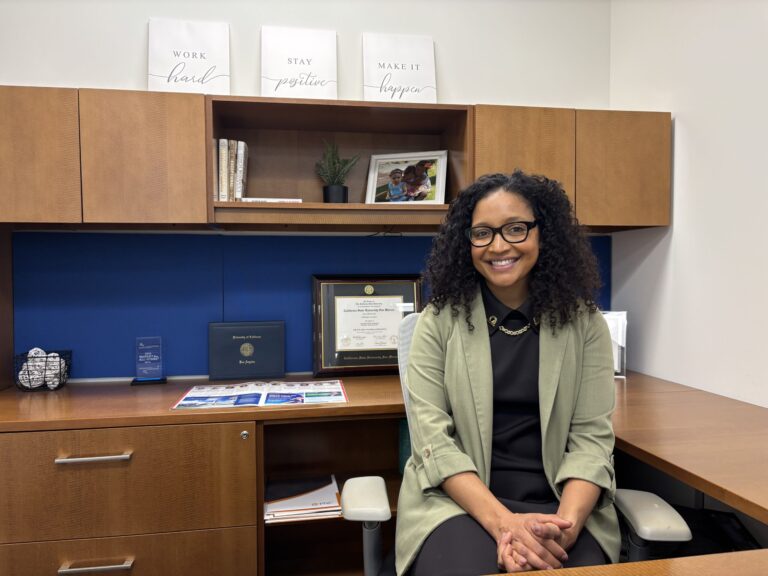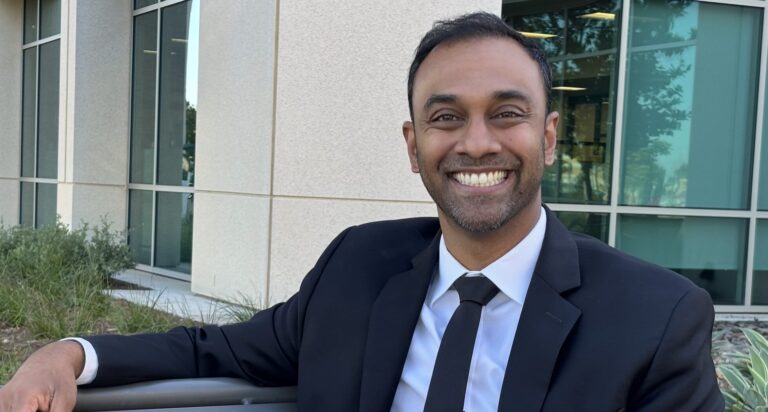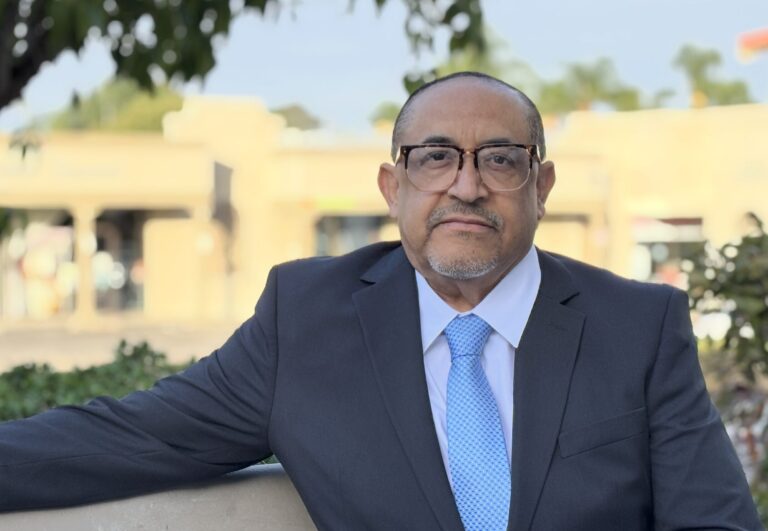By Melanie Slone
Lisette Islas remembers her first day in kindergarten in San Diego after living most of her first five years in Mexico. “I can still remember the dread I felt of begging my dad basically not to take me to school that first day,” she says. “I need to go to this school, and I’m not going to know anybody, and the teacher doesn’t speak the language I speak.”
This experience has shaped who she is today. “I try to hold onto that feeling because there are so many people that I have served and continue to serve and are the focus of my life’s work that go through that every day. So, I don’t ever want to forget what that felt like.”
Believe in Ourselves
Lisette, who today is the Chief Executive Officer at Lifeline Community Services, credits an elementary school teacher with blessing her life. “She taught me to read in Spanish. And then she taught me to read in English, and more importantly, she taught me to believe in myself, to believe that I was smart and capable,” she says. “I think that’s why I’m so committed to education, and early care in education has been such a big part of my career.”
Also in elementary school, Lisette was chosen to receive a $100 scholarship and a trip to the Ice Capades. “I remember coming home and telling my mom, well, now I’ve got to go to college. I got a scholarship, Mom. I gotta go to college.”
Although her parents always pushed her to go to college, Lisette says this external validation was very important to her. “The most important thing you can do is tell someone, I believe in you…Somebody tells you that you’re smart; you’re made to feel smart and act smart, and so more people think you’re smart.”
At her last job, Lisette helped launch a scholarship program that gave every student between $1000 and $2500. “What I would always tell the team is, more than the $2500, what we’re doing is telling somebody, I believe in you. And that has more lasting power than any amount of money we could ever give.”

Social Issues
In high school, Lisette was selected to participate in Upward Bound at UC Berkeley. Thanks to the program, she learned about the UC system as an option. “But more importantly, it opened my eyes to social justice, racial equity issues, that I really had not been as conscious about.”
Lisette was awarded a full scholarship at Berkeley. There, she decided she wanted to be a sociology professor, so she prepared by doing a lot of research projects. But, she says, “If you’re listening, the world speaks to you. You have these moments of clarity when you’re really paying attention.” One of those moments came while doing research for her master’s in public policy at UCLA.
“I was following two sisters in Boyle Heights,” she says, “I was talking to the two sisters while I was playing with the children.” They were out of money for the month and would not be paid for a couple more days. “And I could not tell them where they could go get food because that would impact the results of the study,” she says.
She realized at that moment that, even though she loved research, she did not want to dedicate her life to it. “I want to be the person using the research to transform people’s lives,” she says.
Community First
Lisette was offered a short-term research position at the Jacob’s Center for Neighborhood Innovation, a faith-based foundation in southeastern San Diego. That six-week contract turned into a 15-year journey with the foundation. “That really helped me hone my skills when it came to understanding how to put community first,” she says. “It helped me hone my passion for and understanding of economic development and community development and how the two intersect.”
After spending 15 years in philanthropy, Lisette worked at San Diego Grant Makers, “teaching other philanthropists how to do their work better in service of community.”
Then, she was recruited by MAAC. “It was the first time I was on the nonprofit side of things,” she says. As the executive vice president, Lisette oversaw all the programs “and developed a really deep understanding for the communities that we serve through that lens.” She became involved in the Economic Development Council (EDC), which focuses on the business sector, and was able to bring this group together with MAAC, which focuses on the economic development of communities.
“It was through the inclusive economic development effort that we finally realized that in order for all of San Diego’s business community to thrive, the communities that have been traditionally left behind, both geographically and demographically, need to thrive.”
After 10 years at MAAC, Lisette was happy, but she says, “the opportunity to lead Lifeline [which] has had such a rich history and has been so pivotal in the community, was hard to pass up.” She started at Lifeline on January 9, 2024, and is already making great strides.
Knocking down Hurdles and Lifting Others
“There are a ton of barriers along the way,” says Lisette. “Being a woman in leadership roles, being Latina.” She believes that when her perspective at meetings did not match what was being said, “it was really a motivation to speak up and say, well, here’s a different perspective…It took me a long time to figure out that my uniqueness really was my strength.”
Still carrying with her the lesson of discomfort from when she had to go to kindergarten without knowing English, Lisette wants to make sure to keep the door open so that others do not have to feel that way. “I always say, lift as you climb.” She adds, “first-generation college students become first-generation professionals. We focus a lot on figuring out how to get kids to college and to support them through college, but there’s a lot to be said of the support that people need to be successful as professionals once they finish that degree.”
In partnership with USD, Lisette helped establish a year-long leadership academy program for supervisors at MAAC and is working on the same thing at Lifeline. “I believe largely in investing in our staff, the development of nonprofit leaders,” she says.
She also urges everyone to seek out their passion, like she did by joining Lifeline. It was “a growth opportunity for me and an opportunity to serve my community in a different way…taking this leap of faith.”
Since Lisette has taken on her post at Lifeline, the leadership team has worked hard to diversify. “I believe strongly that nonprofits at every level need to reflect the communities that they are serving. We need to have diversity of thought, diversity of experience, so that we have the appropriate perspective and approach when we’re serving the communities…Many of Lifeline’s board members come from communities like those the organization is serving.”
Going forward, Lifeline hopes to expand in both behavioral health and economic development. “We’re moving more and more toward an emphasis on the economic development component so that we can continue to serve families.”
There are also plans to enhance partnerships with community leaders, “so that we assure that the decision making that is happening on a day-to-day level really is in service of the communities that we focus on.”
Because she was forced to navigate situations on her own, Lisette now has “this deeply held belief of the importance of opening a door and keeping it open for somebody else to come behind you. Don’t just lift as you climb, she says, “be okay if they leapfrog you.”
Lifeline Community Services
760-726-4900
Live Chat online
- Programs to help families get stable and thrive as individuals and as family units.
- Five primary areas: Mental and behavioral health; Youth development; Housing and self-sufficiency; Child abuse prevention; Anti-human trafficking.
- Emphasis on self-reliance.
- Interventions to stabilize people in homelessness, mental health crises, interactions with Child Protective Services.
- Therapy, housing, behavioral health services, income support, job-training programs.
- Partnerships with many local organizations.
- Links between communities and the county health and wellbeing programs.
- Services in San Diego for more than 50 years.
- About 75% served are Latino.
- 90% served are BIPOC.
- Nearly 100% served live below the federal poverty line.
- About 80% are young adults or minors.
- Completely bilingual.




